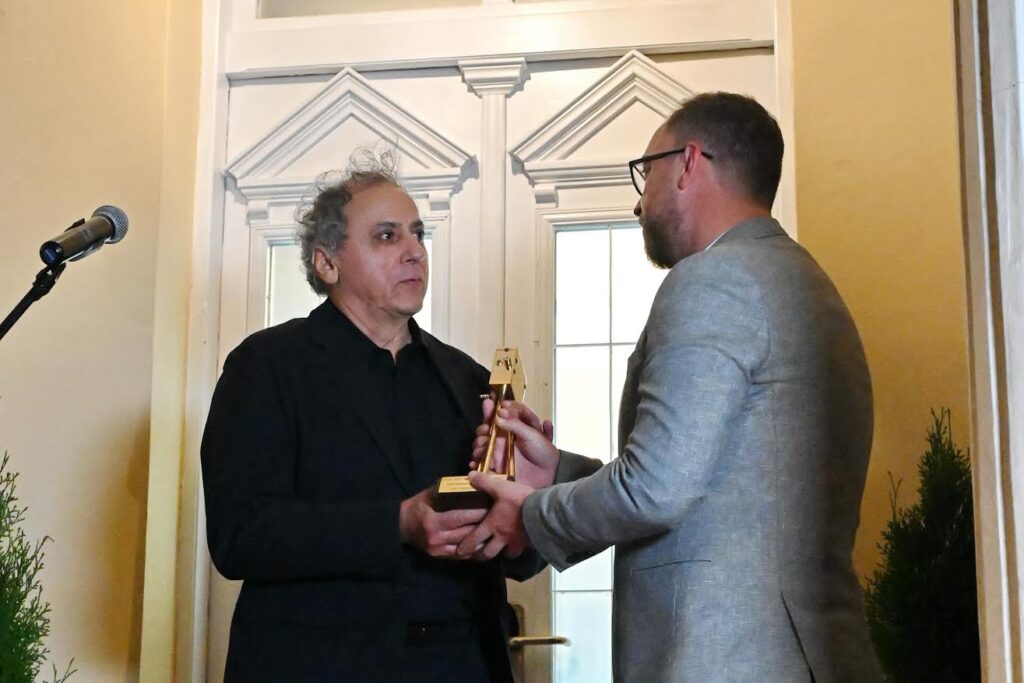Darius Khondji, the laureate of the Golden Camera 300 for Lifetime Achievement and the author of beautiful images that speak of his greatness, spoke today at a press conference in Bitola about his collaboration with directors, the way he works on film, but also about shooting videos…
-I like working with good directors. Directors that I can establish a special connection with, but of course, I have to like what they do, although the most important thing is that I need to be able to help them achieve their vision. To achieve what you want, to be immersed in the work process and to find yourself in it. And the directors have to find themselves in the collaboration with me and want to work with me more than I want to work with them, said Khondji.
He pointed out that he requests full involvement of film directors in post-production.
-It’s more important for them than it is for me, because it’s good for them to be involved in every segment of the work so that we can convey the message with the final outcome.
He has shot films all over the world, but he really liked working in Mexico.
-A few years ago I worked in Mexico and then the director became a very good friend of mine. I really love the country and the people and I think that Mexico as a country is very powerful emotionally. I am half Persian, half Iranian, I also have something French in me and I am often told that this connection I feel with Mexico is strange. From the little opportunity I had to see Macedonia so far, I am starting to have the same feeling. I travelled at night and today when I woke up and saw the city, I immediately got a pleasant feeling, said Khondji and pointed out that he really likes Macedonian and regrets that he does not speak it.
He works with different types of equipment and cameras and says they decide what camera to use together with the film director.
-I don’t think I would be able make such a decision alone, it’s always in coordination with the director. I like it when we decide together, for several reasons. My most recent film will be ready by the end of December, and we shot it with a digital camera, because we had very few shooting days. After all, this is a creative process and you work with what you have. The most important thing is to show the characters, to convey the story, and which medium you rely on to do this is not the most important thing. However, for me, film stock has a more organic feeling, but the last time I was shooting I experienced
something I hadn’t experienced before, so this is an open field where we need to explore our creativity, said Khondji.
He has also worked on music videos with Nene Cherry, Taylor Swift, and Lady Gaga, as well as Madonna’s “Frozen”… with director Chris Cunningham.
“Cunningham is a great artist. He’s a wonderful human, an incredible director. Most of you may not know who he is, but he’s like the Renaissance artists – we don’t know them all, but there were really great people at that time who didn’t become famous,” Khondji concluded.
David McFarland and Dominik Sedlar, the cinematographer and the director of the film “Vindicta” which was screened in the Official Competition last night, were also introduced at today’s press conference.
“I decided to follow the human experience, to make films that explore the human struggle, and I filmed in Tibet, India, Palestine, Afghanistan, and that brought me to Zagreb and to this crew. I worked with people who were better than I could have expected, especially the camera operators”, said McFarland, who pointed out that they wanted the audience to fully connect with the protagonist and the story through the aesthetic choices, not to have very long and very wide shots, and the audiences to be able to connect through the lighting.
Director Dominik Sedlar said that he worked with a great crew, and the idea of love was always an interesting concept for him to work with.
The cinematographer of the film “The Land Beneath Our Feet”, Wojciech Staroń, said today that he loved documentaries because it was there that he found what he was looking for in cinematography and that after his studies he proceeded to make documentaries because they allow him greater freedom and to discover reality.
“The camera gives us the opportunity to connect with people we don’t know. The camera sees more than the human eye, it reveals much more, and that’s exactly what attracted me to this work”, said Staroń.



